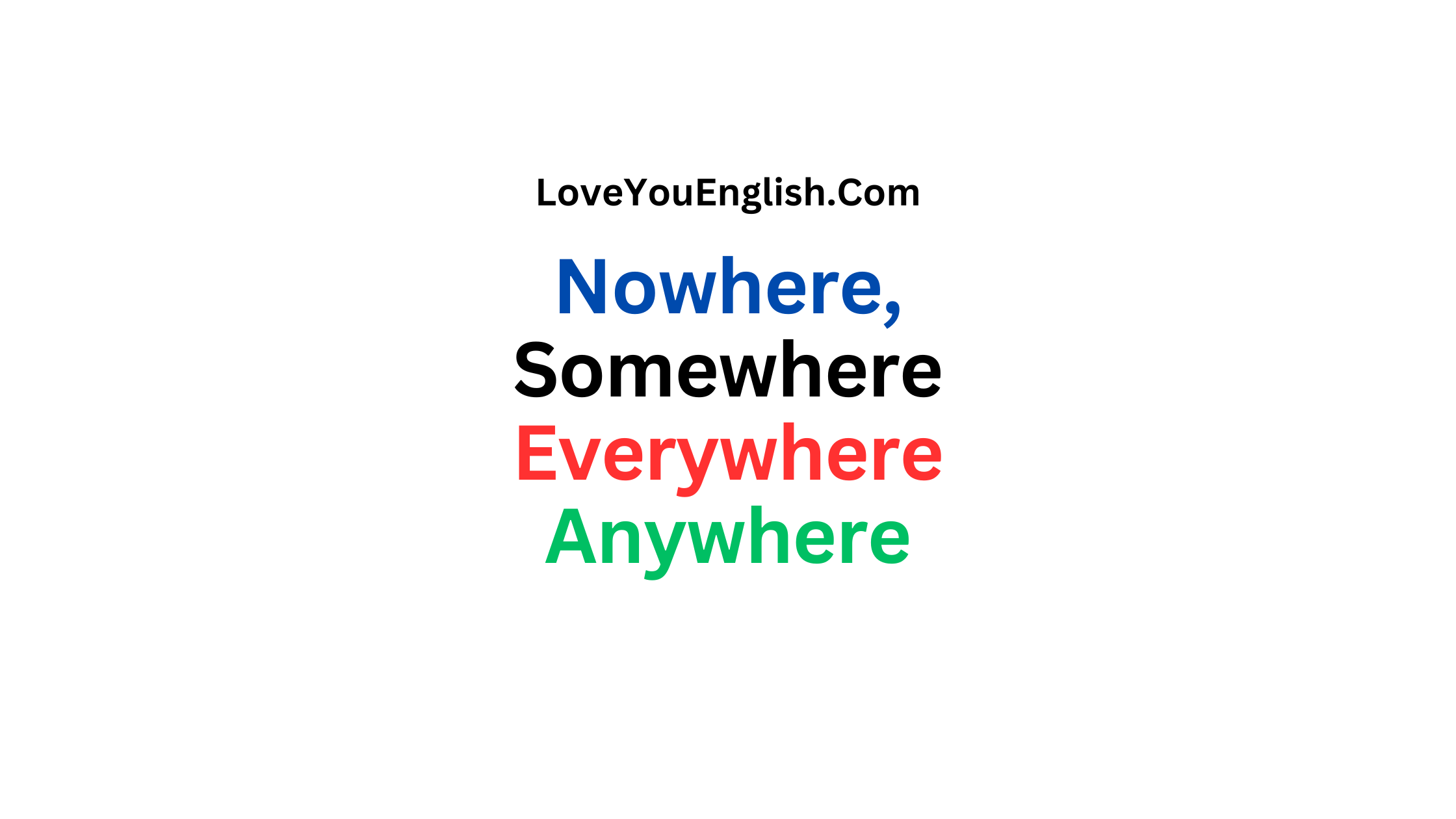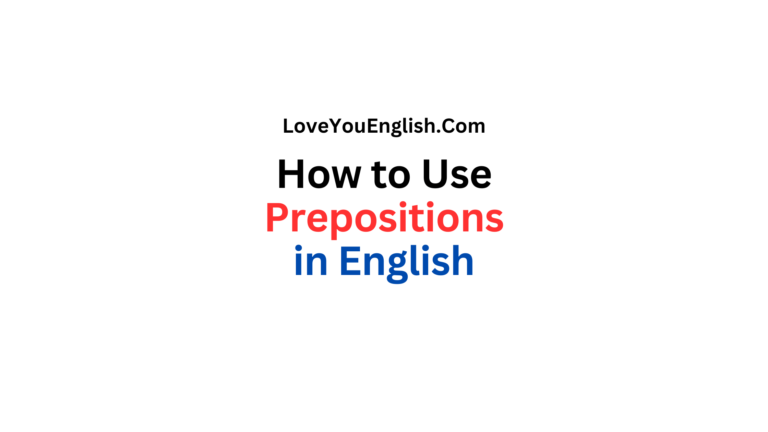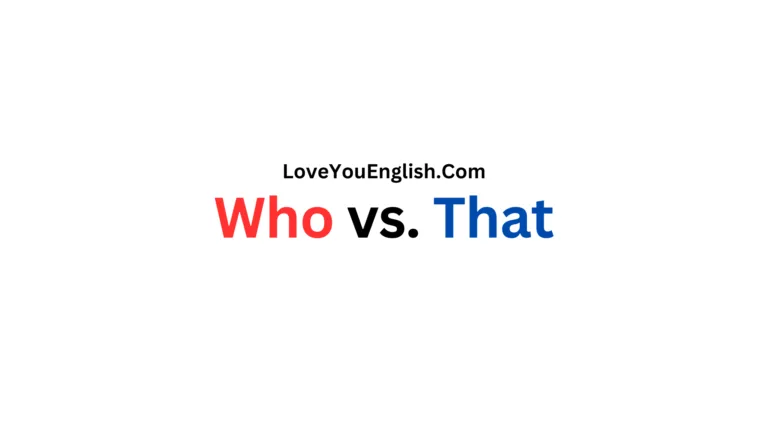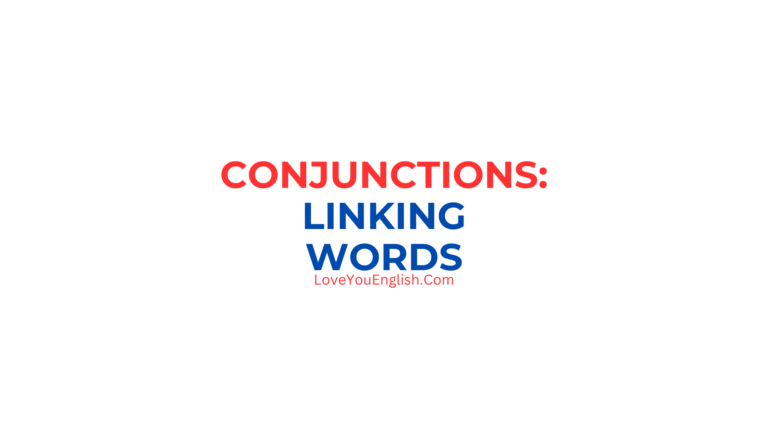How to Use Nowhere, Somewhere, Everywhere, and Anywhere
How to Use Nowhere, Somewhere, Everywhere, and Anywhere is a clear and practical guide for English learners who want to use place-related words correctly and confidently. These four words are very common in everyday English, but many learners get confused about when and how to use them in positive, negative, and question sentences. This topic explains the meanings and grammar rules of nowhere, somewhere, everywhere, and anywhere with simple explanations and real-life examples. Written in easy English, it is ideal for school students, ESL learners, and beginners who want to improve both spoken and written English. Learning the correct use of these words helps you avoid common mistakes, speak more naturally, and express ideas about places clearly in daily conversations and writing.
This topic is part of our English Grammar for English learners.
What Are These Words Anyway?
Before I get into the details, let’s understand what nowhere, somewhere, everywhere, and anywhere are. They’re called adverbs of place.
That’s a fancy way of saying they tell us about location—where something is (or isn’t) happening. They don’t need extra words like “to” or “at” to make sense, which makes them super flexible.
You can use them to talk about real places, like a park, or imaginary ones, like a dream world. Ready to see how they work? Let’s start with the first one.
Nowhere: The Land of Nothing
Imagine you’re looking for your keys, and they’re not in your pocket, not on the table, not anywhere you can think of.
You might say, “My keys are nowhere to be found!” That’s what nowhere does—it means “not in any place.” It’s the word you use when something is completely missing or doesn’t exist anywhere.
Here’s an example: “I looked for a good movie to watch, but there was nowhere with anything interesting.” See how it works? It’s like saying there’s zero chance of finding what you want. You can also use nowhere to exaggerate. If someone asks where you’re going and you’re just wandering, you might say, “Oh, I’m going nowhere special.” It’s casual and adds a little drama.
One thing to watch out for: nowhere is always one word. Writing it as “no where” is a common mistake, so keep it together. Now, let’s move on to a word that’s a bit less lonely.
Somewhere: A Mystery Spot
Picture this: You’re at a party, and someone asks where your friend is. You’re not sure, but you know they’re around. You say, “They’re somewhere in the house.” That’s somewhere—it means “in a place, but I don’t know exactly where.” It’s vague, but it still promises that a location exists.
You can use somewhere when you’re unsure or don’t want to be specific. For example: “I left my phone somewhere in the park.” It’s not super helpful for finding the phone, but it narrows things down a bit. Or how about this: “Let’s go somewhere quiet tonight.” It’s an invitation to explore without picking an exact spot.
Here’s a fun tip: somewhere often pairs with questions or guesses. If you ask, “Is there somewhere we can sit?” you’re hoping for a yes. It’s less certain than the next word on our list, which takes things to a whole new level.
Everywhere: All the Places at Once
Now imagine you spill glitter on the floor. No matter where you look—under the couch, on the rug, even in your shoes—it’s there. You’d say, “There’s glitter everywhere!” That’s what everywhere means: “in all places.” It’s big, bold, and covers everything.
This word is great for describing something that’s all over. Think of rain: “It’s raining everywhere today.” Or maybe a mess: “Toys are scattered everywhere in the room.” It paints a picture of something you can’t escape. You can also use it for emphasis, like, “I’ve looked everywhere for my wallet!” (Even if you skipped the laundry basket.)
One cool thing about everywhere is how it stretches an idea. If you say, “She’s famous everywhere,” it feels like the whole world knows her. But don’t overuse it—save everywhere for when you really mean all places. Next up is a word that’s a little more open-ended.
Anywhere: The Wild Card
Let’s say you’re hungry and someone asks where you want to eat. You shrug and say, “I don’t care, anywhere is fine.” That’s anywhere—it means “in any place at all.” It’s the most flexible of the bunch because it doesn’t pin you down to one spot or rule anything out.
Anywhere is perfect for choices or possibilities. For example: “You can sit anywhere you like.” It gives freedom—no limits! It’s also great in questions: “Is there anywhere we can get coffee?” You’re asking if even one place exists, without being picky. And in negative sentences, it flips: “I can’t find my socks anywhere” means you’ve checked and failed.
Be careful, though: anywhere is one word, not “any where.” People sometimes split it by accident, but keeping it together is the rule. Now that we’ve covered all four, let’s see how they play together.
Comparing the Four: What’s the Difference?
Still confused about when to use each one? Let’s put them side by side with an example. Imagine you’re talking about a lost dog:
- “The dog is nowhere in the yard.” (It’s not there at all.)
- “The dog is somewhere nearby.” (It’s close, but you’re not sure where.)
- “The dog is everywhere we go!” (It’s following you all over.)
- “The dog could be anywhere by now.” (It might be in any place, who knows?)
See the pattern? Nowhere is nothing, somewhere is vague, everywhere is everything, and anywhere is open-ended. They each have a vibe: nowhere feels empty, somewhere feels mysterious, everywhere feels full, and anywhere feels free. Picking the right one depends on what you want to say.
Tips for Using Them Like a Native
Want to sound natural? Here are some quick tricks:
- Add “to be” for emphasis. Saying “The party is nowhere to be seen” sounds stronger than just “The party is nowhere.” It’s a little formal but works well in writing.
- Pair them with verbs. Try “I’m going somewhere fun” or “She’s been everywhere this summer.” It keeps your sentences lively.
- Use them in questions. “Is there anywhere to park?” or “Did you look everywhere?” makes you sound curious and engaged.
- Watch the tone. “He’s going nowhere in life” is a jab, while “Let’s go anywhere you want” is sweet. The same word can shift depending on how you use it.
Common Mistakes to Avoid
Even native speakers slip up sometimes. Here’s what to dodge:
- Don’t split the words. It’s nowhere, not “no where”; anywhere, not “any where.” Spellcheck might not catch this, so double-check.
- Don’t overuse everywhere. If you say “I see birds everywhere,” but you just mean the park, it’s too much. Use somewhere or be specific.
- Don’t confuse anywhere and somewhere. “Can we go anywhere quiet?” means any quiet place is okay, while “Can we go somewhere quiet?” assumes a quiet place exists.
Why These Words Matter
You might wonder, “Why bother learning this?” Well, these words aren’t just grammar—they’re how we share our world.
Saying “I feel like I’m going nowhere” tells a story of struggle. “Let’s go somewhere new” sparks adventure.
“Love is everywhere” spreads hope, and “I’d follow you anywhere” shows trust. They’re small, but they carry big feelings.
Plus, using them right makes you clearer. If you tell a friend, “I can’t find my hat anywhere,” they’ll know you’re desperate—not just guessing it’s somewhere. It’s about painting the picture you want people to see.
Wrapping It Up
So, there you have it—nowhere, somewhere, everywhere, and anywhere, unpacked and ready to use.
Start with nowhere for nothing, somewhere for a hint, everywhere for all of it, and anywhere for whatever works.
Play with them in your next conversation or story, and watch how they bring your words to life. Where will you take them? Anywhere you like—the choice is yours!
Explore more English grammar topics:
- Cleft Sentences for Emphasis in English
- How to Use Future Tenses Correctly
- The Ultimate Guide to English Grammar for Learners
- Different Uses of “Have” in English: A Simple Guide
- How to Use Punctuation Correctly in English






